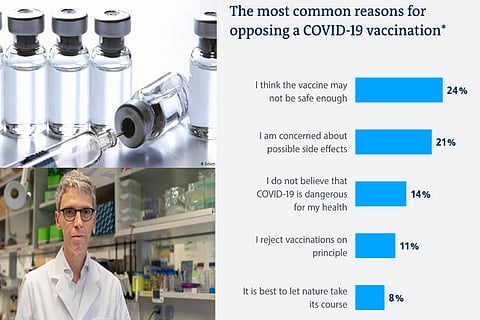

Chennai
One of the vaccines that has attracted particular attention is the so-called Oxford vaccine ChAdOx1. The vaccine from biotechnology company Vaccitech was developed by the British-Swedish pharmaceutical company AstraZeneca in collaboration with the University of Oxford and is also known as AZD1222.
Immune response
The Guardian, quoting unnamed developers, reported on 27 October that the latest research suggests the vaccine “produces an immune response in older adults as well as the young.” The paper added, however, that “neither Oxford University nor its commercial partner AstraZeneca would release the data from the early trials showing the positive effects, which are being submitted to a peer-reviewed journal”. It also said that AstraZeneca shared its findings at a recent closed academic meeting. The European Medicines Agency (EMA) has already started a review of AZD1222. It is the first time this has been done in the European Union for a coronavirus vaccine.
In view of the urgency of the current situation, the review is being conducted under an accelerated procedure. To save time, the authority is checking the test data while it is still being collected. Usually, tests have to be completed first, with all results then being presented to the EMA at once. Under the current procedure, it is conceivable that the vaccine could be released just a few days after the end of the tests — if the authority is convinced that it is efficacious and safe. However, the EMA has so far declined to say how long the review and evaluation will take. It says only that tests with thousands of volunteers are underway and that the results are expected in the next “weeks and months.”
Risky advance orders
Although it is not yet clear whether the vaccine will be approved in the end, numerous governments, including that of Germany, have already preordered tens of millions of vaccine doses. And AstraZeneca has already entered a binding agreement with the Serum Institute of India to produce at least 300 million doses.
For the governments that have ordered the vaccine, but also for AstraZeneca itself, this preplanning is an economic gamble. If the vaccine is ultimately approved and the manufacturer can then bring large numbers of vaccine doses onto the market at an early stage, considerable profits could be made. But the risks of not obtaining approval are also enormous.
Attacks by critics
Critics like the Austrian health ecologist Clemens Arvay are seeing all this as confirmation of their belief that the powerful pharmaceutical industry, backed by sponsors like Bill Gates and with tacit political approval, wants to bring the vaccine onto the market at any cost in pursuit of these profits. Arvay, who is a biologist and runs a YouTube blog, argues that in the process, it is ignoring due medical caution and putting the health of the public at risk.
He backs up his argument with a number of points: The active substance did not create sufficient protection against infections in the preclinical phase in primates and was nevertheless approved for a combined phase I and II trial. In this phase there were severe side effects: fever and a decrease in white blood cells (neutropenia). Despite this, the vaccine was approved for phase III. And now there has been a serious incident in phase III, with one patient ending up suffering from transverse myelitis — but research continues.
Taking concerns seriously
“I can understand the concern that people are not working carefully because the pressure is so great,” says Prof. Stephan Becker, a virologist from the University of Marburg in Germany. “So there is some reason to keep a close eye on things.” Becker himself was involved in the combined Phase I and II study. His institute carried out the immune monitoring in the “neutralisation assay,” or test for neutralising antibodies. This means he and his colleagues checked whether one of three desired immune responses to the vaccination worked.
— This article has been provided by Deutsche Welle
Visit news.dtnext.in to explore our interactive epaper!
Download the DT Next app for more exciting features!
Click here for iOS
Click here for Android